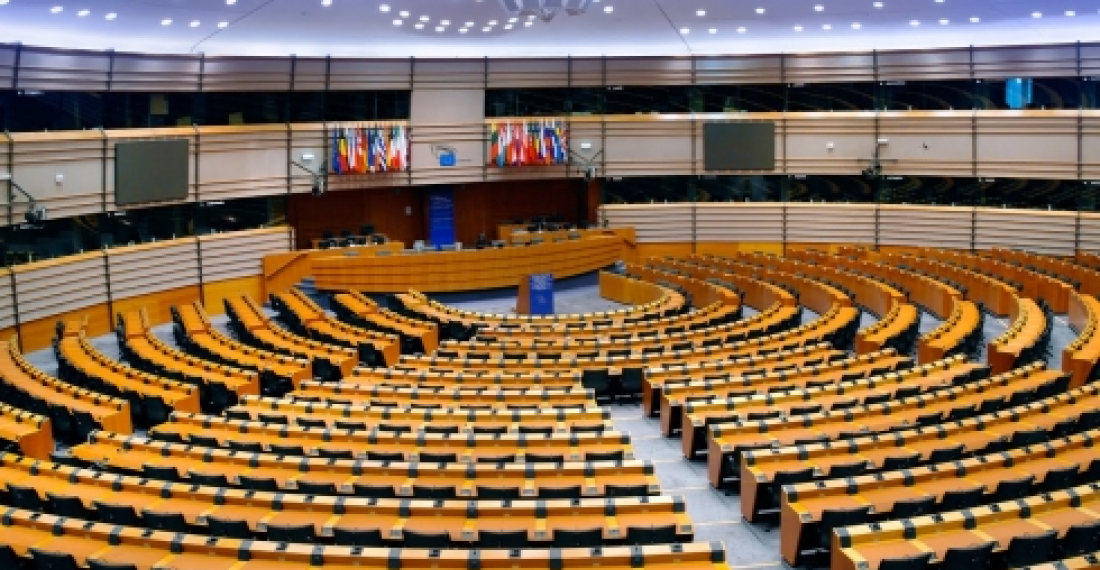The European Parliament has passed a resolution urging "Armenia and Turkey to use the centenary of the Armenian genocide to renew diplomatic relations, open the border and pave the way for economic integration, says the European Parliament in a resolution voted on Wednesday. MEPs stress the need for Turkey to recognise the Armenian genocide, so as to pave way for 'genuine reconciliation'", according to a press release on the Parliament website. They also commend the statement by Pope Francis on 12 April honouring the centenary of the genocide.
The statement said that MEPs invite Armenia and Turkey to "use examples of successful reconciliation between European nations" by ratifying and implementing, without preconditions, the protocols on the establishment of diplomatic relations, opening the border and actively improving their relations, with particular reference to cross-border cooperation and economic integration.
MEPs also commended the statement by Pope Francis of 12 April "honouring the centenary of the Armenian genocide in a spirit of peace and reconciliation".
They welcomed statements by the President and Prime Minister of Turkey offering condolences and recognising atrocities against the Ottoman Armenians and encourage Turkey to "use the commemoration of the centenary of the Armenian genocide as an important opportunity" to open its archives, "come to terms with its past", recognise the genocide and so pave the way for a "genuine reconciliation between the Turkish and Armenian peoples".
They also asked Turkey to conduct "in good faith" an inventory of the Armenian cultural heritage destroyed or ruined during the past century within its jurisdiction.
MEPs payed tribute to the memory of the one-and-a-half million Armenian victims who "perished in the Ottoman Empire" a hundred years ago.
Finally, they proposed that an "International Remembrance Day for Genocides", be established to "recall again the right of all peoples and all nations throughout the world to peace and dignity".
EuFoA welcomes resolution
The organisation European Friends of Armenia, in a statement warmly welcomes this resolution. EuFoA Director Eduardo Lorenzo Ochoa said: "The European Parliament has once again proven its solidarity and support to the Armenian people, paying tribute to the innocent victims of the Genocide thus expressing its strong rejection to any kind of genocide denialism. The Parliament's stance on genocides and crimes against humanity could not be clearer!"
"Today's vote is also an example of a successful joint work by all Armenia-related organisations in Brussels, and we are proud that EuFoA could also contribute to achieving this important goal. We are also grateful to the European Parliament political groups for their support and understanding of the different aspects of this important matter" adds Mr Lorenzo Ochoa.
Turkish reaaction.
Armenia and Armenians in the diaspora say 1.5 million were killed by Ottoman forces in a targeted campaign to eradicate the Armenian people from what is now eastern Turkey. According to the Turkish Daily, Hurriyet Daily News Turkey takes a sharply different view, saying hundreds of thousands of both Turks and Armenians lost their lives as Ottoman forces battled the Russian Empire for control of eastern Anatolia during World War I.
The newspaper added that ahead of the vote, Turkish President Recip Tayip Erdoğan said Turkey would ignore the resolution, adding "it would go in one ear and out from the other."
"This resolution cannot merely be explained away by either lack of knowledge or ignorance. Unfortunately, what lays behind is a religious and cultural fanaticism and indifference towards others regarded as different," the Turkish Foreign Ministry said in a written statement minutes after the adoption of the resolution at the European Parliament.
"The European Parliament known for contriving obstacles to the development of Turkey-EU relations aspired once again to rewrite history regarding the 1915 events, as it has attempted to do so previously. This aspiration resulted in a preposterous text of resolution dated 15 April 2015 which literally repeats the anti-Turkish clichés of the Armenian propaganda," read the statement.
"With this resolution, the European Parliament repeated exactly a mistake it has made in the past in an incompatible way with international law and exceeding its competence," the ministry recalled, stressing: "We return this text, which is an unprecedented example of incoherence in all its aspects, verbatim to the aforementioned institution so that the text finds its place among the documents that the European Parliament will shy away from remembering in the future. Those who adopted this text may perhaps recall that the EU was established on the pillars of reconciliation and peace culture, and on the basis of the principles such as democracy, human rights and free market economy."
Warning about relations
Accusing politicians who voted in favor of the resolution of feeding on hatred, revenge and culture of conflict, the ministry warned the Parliament that the vote brought about the potential to harm the relations between Turkey and the EU and falls far behind from bringing a solution to the issue between Turkey and Armenia.
"If the European Parliament wishes to contribute to building a common future for European peoples, it should realize that this cannot be achieved by excluding different religions and cultures. As for the 1915 events, it is evident that Turkey has assiduously fulfilled its duty with regards to memory. We hope that Armenia also achieves such a level of maturity as soon as possible," the statement said.
"Members of the European Parliament may better encounter their own past and remember especially their roles and responsibilities in the most abhorrent calamities of humanity such as World War I and World War II, well before dealing with the 1915 issue," it concluded.
source: commonspace.eu with www.europarl.europa.eu, EuFoA and Hurriyet Daily News.
Photo: The meeting room of the European Parliament (archive picture).







